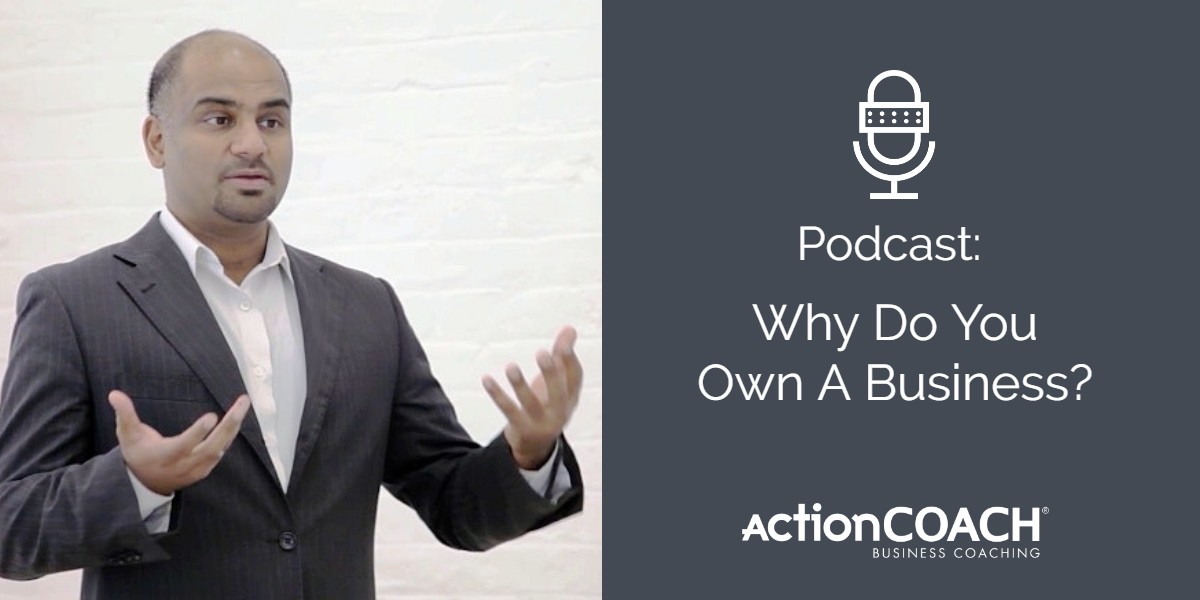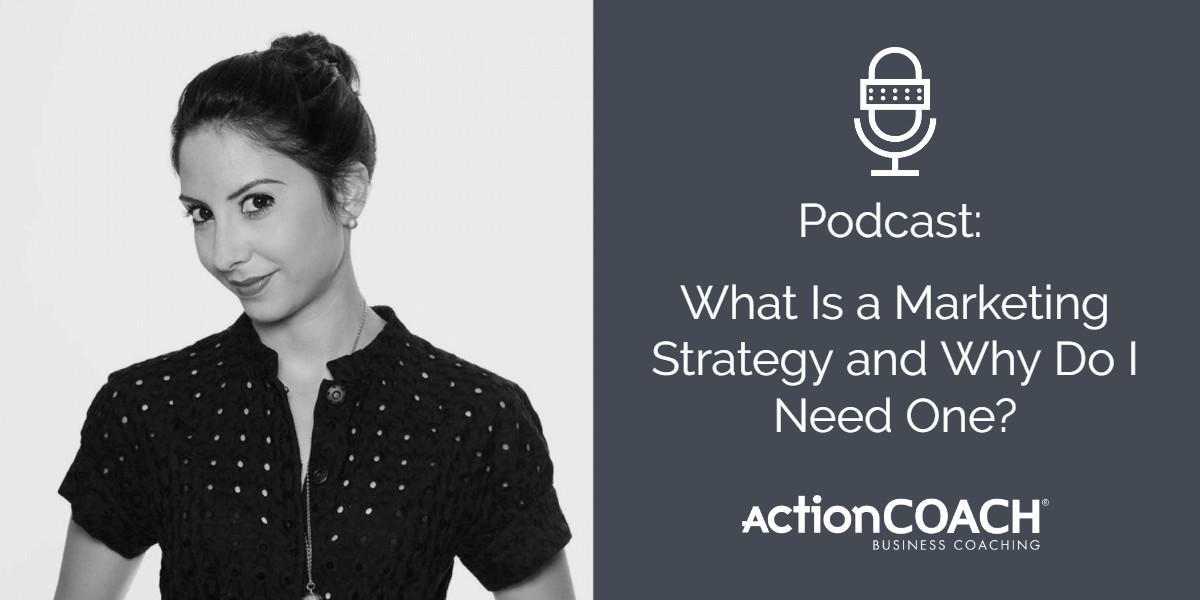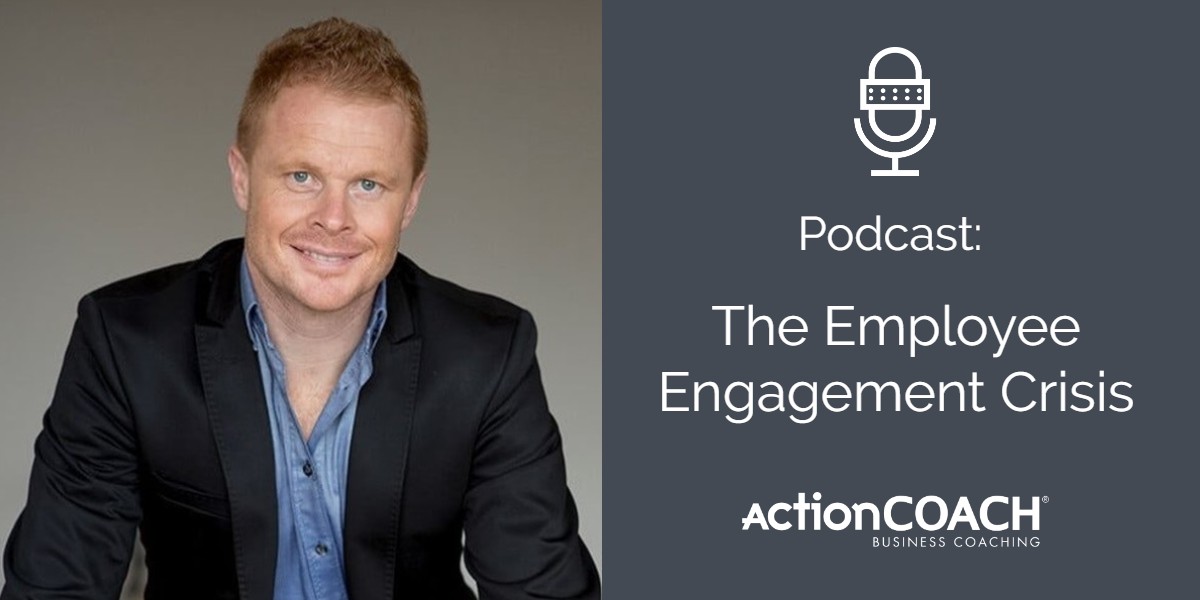Podcast: Why Do You Own A Business?
Podcast: Play in new window | Download
In episode number eleven, we talk to our Head Coach and Managing Director, Parag Prasad about the three levels of purpose for a business owner: survival, success and significance.
Click the play button above to listen.
Episode highlights
2:47 What are the reasons most businesses never move beyond survival mode?
5:18 The second purpose of a business: to provide you with time, money and personal fulfilment
7:10 What is the ‘survival trap’ and how do you get out of it?
9:30 Why success can be equally dangerous when it leads to complacency and stagnation
11:10 Why aiming for significance, contribution and legacy should be the ultimate goal
Transcript
Margarida: Hi, Parag and welcome to the show. You are our Managing Director and head coach here and you’re here to talk about the purpose of a business. You’ve told me there are three different purposes of a business; tell us about the first one, please.
Parag: Hi, Margarida! Yes, well, at the basic level, business is there to provide a product and a service, and of course to survive. That’s the number one obligation of a business. To fulfill the needs of the owner and the team, by paying their wages, and of course paying the bills. Now, that’s what I describe as business being in survival mode. Even worse, there are many businesses who are barely fulfilling even this definition of survival. They’re having to borrow funds just to stay alive, or not even pay themselves properly to maintain company cash flow.
Unfortunately, it’s a statistical fact that the majority of UK businesses run exactly to this survival model for the entire life cycle. To me that’s utterly tragic. I’ve seen this survival mode of business many times in my life. I’ve seen the negative consequences that this type of business has on the owners and on the people that are dependent on that business. It’s the reason really why I decided to quit my successful career –
Margarida: As an accountant?
Parag: That’s right, as an accountant in the City. I decided to go and be trained as a business coach. Really, my first question for our listeners today is to ask, is that really what they got into business for when they started. Is that what the dream was, when they started their business. Was it just for them and their families to survive? Well, of course that’s not what I’ve heard over the last 12 years of coaching from so many ambitious, inspiring entrepreneurs that we work with. That’s not what they had in mind.
The really sad thing for me is that even though these guys with great big aspirations are trying to achieve great things, after a while of being in this survival mode, this just becomes their new normal. I’ve seen it at first hand too many times, and it’s a statistical fact that most UK businesses are running this way. One of the key roles for me, and our team, is to stretch a business owner’s thinking about what owning a business is really all about, and of course, how they can get to that point.
Margarida: What have you observed are the reasons most UK businesses never move beyond survival mode?
Parag: Well, Margarida, for me, I see business owners get hit by setbacks and those setbacks become their excuses for why they’re not moving forward. Just to give you some examples, I hear things like, well, Parag, it’s been a tough year or bad year. We’re in a more competitive marketplace or the economy isn’t great at the moment. It’s the suppliers challenging us on prices. It’s Brexit or regulation. The banks didn’t lend us any money or I don’t have fancy qualifications or I don’t have business qualifications or I don’t have any qualifications. You name it, Margarida.
For me, someone will always find an excuse for underperformance, if they choose to look for one. Some people are absolutely masters of finding excuses. For me, taking self-responsibility for your own performance is one of the critical mentalities to move people away from just that basic survival mode. I always say, success is an inside job. It’s a mental game. A good example of some of these pervasive mentalities comes from a client I’ve been coaching. Peter Owen, I know you know Pete.
Margarida: Yeah, yeah.
Parag: He runs Rat Race Cycles, a bike repair and service workshop in Southeast London. Your typical small business. Pete’s always telling me that he’s on these forums with other bike owners around the UK. They’re constantly complaining about the poor state of the industry, about competition, about lack of opportunities, price pressures. The interesting thing is that when Pete started coaching a few years ago, he realized that just colluding with these guys, i.e. just agreeing with them, it wasn’t helping him. It wasn’t serving him. It was stopping him learning new skills. It was stopping him learning anything new, looking for solutions. He realized that he really urgently had to change his mentality towards his business.
Margarida: Okay, Parag, so what’s the next level, the next purpose of a business then, after just survival?
Parag: Okay, well, let’s talk about success. We’ve had survival; now let’s talk about success. Our clients have generally defined success in three ways: time, money, and personal fulfilment. Success with time for example can be defined in numerous ways. It could be that you want to have six to eight weeks off in the summer on holiday with your kids. It could be a three-day week for you. It could be a three-day month. It could early retirement at, say, 50. It could be financial retirement and freedom at age 40. There’s numerous examples of this.
One of our clients, James, another one that you know very well. He’s just had his first child actually and he’s gone to live in Seville in Spain for six months whilst his engineering firm, which is just around the corner from our office here in Central London, carries on without him. This definition of success, having a business run without you, or far more without you, is without doubt the most common goal that business owners tell us they’d like to achieve. Coaching people to achieve these kinds of goals is really where I get excited as a coach, and I know you do and Dan and the others in our team. I have to ask our listeners, Margarida, if their goals around time, around money, around fulfillment have actually been defined. I’m just amazed at how few people have defined these goals for their business and for their lives.
Margarida: What’s the danger if they don’t define this stuff?
Parag: Well, you see, without an end goal to drive you forward, you end up losing your way and falling behind. Just imagine the analogy of driving a car and you don’t have a map. You’re going to get lost. I’ve seen all negative consequences of not consciously setting goals and plans to improve things like time. I’ve seen some very distressing health issues, stress, mental health impacts. I’ve personally coached nearly 350 business owners since I started, but I very vividly remember the owners who’ve suffered due to poor use of their time. These are the stories that have really stuck with me in my mind, and it’s what drives me and our team to do what we do.
Many business owners think they’re super-human. That they can flog themselves hard year after year and year, sacrifice their health, their family time, relaxation, even relationships. They’ve somehow sold themselves on this as being their plan for success. When we coach people out of these traps, then they do reach what most people would consider this definition of success. They’ve built great systems and people, so they don’t have to be there all the time in their business. They have consistently grown profits and cash flow. Our definition of good cash flow is that it should cover three times your monthly overheads. Usually at this point, they’ve achieved that definition, or exceeded that.
They’ve got money and cash in the business. The team works. They also have a personal income that they actually deserve for someone in their position, to the extent that they’re actually investing money in things like expanding property portfolios, be that residential or commercial assets. They’re making annual contributions to their pension funds. Their time and financial goals are actually being achieved. They’re also achieving fulfillment, Margarida, in terms of things like working with the right kind of customers, their ideal customers, winning awards, industry recognition, great reputations in their industries and their communities.
Margarida: Well, this sounds like a great definition of success for our listeners, yet I believe you are suggesting there is a level of business, even above this one.
Parag: Well, yes, absolutely, Margarida. That is success in most people’s eyes, but you see, there’s actually a danger with being successful. You’re looking at me a bit strangely here, and I know it might sound a bit crazy. What I’ve just defined sounds like most people’s definition of their dream of success. Yet the danger with being at this level of success is that people become comfortable. You know about comfort zones. When human beings become comfortable, they stop growing. They stop learning and they start to slip backwards, or even get overtaken. When someone is in survival mode, going back to our first level, how strong is their desire to move away from that survival mode?
Margarida: Very strong I would say.
Parag: Yes. Yes, they’ve fallen into what I call a pit, a pit of despair and they don’t like it. You’re right, it’s very strong; they want to get out. Now compare that to when you’re in success mode. You’re not going out of business any day soon, the bank, your suppliers, they’re not screaming at you to pay them, all those stresses. Your family aren’t even screaming at you to earn more money. It’s at this time that your drive and focus can often diminish, and the danger here is that you could fall back into that pit of despair. That’s why I say you need to define a third level of the business. A third level, even above success.
Margarida: Which is?
Parag: Right, I know you’re waiting there. It’s what I call significance. Survival, success and now significance, or you could call it contribution or legacy. At this significance level, the business is no longer about just servicing your own personal needs. Now, I’ll just say that again. The business and the purpose of your business is not to just serve your own personal needs, nor those of your family or employees. The purpose has actually moved well beyond those. Be it now to support charities or philanthropic goals, making changes in your industries or sector, new job creation, which is a purpose that I’m particularly passionate about.
One of our clients, Scott, Scott’s a long-standing client of mine –
Margarida: I know him as well.
Parag: You know, Scott, yes. Great guy. He runs an estate agency and he has all these success-orientated goals that I talked about earlier. Scott also has a higher level purpose, which is to change the way that people think about how estate agents work. I’m sure you’ve come across estate agents, Margarida, as all our listeners have, and some of the perceptions of estate agents aren’t particularly positive. He wants to change the way that people feel.
Margarida: People’s perceptions.
Parag: Yeah, the perceptions and how they feel about that customer experience of dealing with agents. Another example, and I know you know this guy as well, Andre, Andre Hackett.
Margarida: Of course, I know him, yes.
Parag: Well, Andre is the business partner of the recording artist, Fuse ODG. A huge part of their vision for their business is actually to build schools for under-privileged kids in their home country, Ghana. Even bigger than that, to change the perceptions of a Continent, of Africa.
Margarida: Huge [jump].
Parag: Yeah. These are just two young guys making music, and it’s a vision and a purpose that’s maybe hard to get your head around. When you have purpose at that level, you realize that making £1 million of sales actually is simply not enough. Making £10 million of sales, which some people might define as successful, is just not enough. It will never be enough to satisfy such a huge purpose and vision.
When I really thought about the importance of this level of significance in our business, in our coaching firm, and this was about seven, eight years ago, everything changed for me. By that I mean, firstly our results as a business, but also the impact that we’ve had on our business community. We’re about six times bigger in terms of income and clients, so we’re coaching about 100 business owners a month now. The main thing that’s driven this growth and expansion is to transition – for us to work on a purpose, on a significance that’s to serve our business community. To empower 1,000 business owners by 2022, which is a goal I set in 2015. Also, for us to help our clients create at least 5,000 new jobs in London.
Margarida: Wow!
Parag: Yeah, so this was the purpose and our significance that I defined about five years ago. Really, my final thoughts on this concept of significant is to ask our listeners today whether we, as business owners and leaders, actually have an obligation to think of our businesses this way. To think of our businesses as serving more than just ourselves. I was asked this question, this exact same question, by my coach all those years ago, and it really got me thinking. Then actually making the changes in our business to enable this to happen. Perhaps this will stretch some of your thinking – some of our listeners thinking today, about how they can make these similar changes in their business. I’d absolutely love for many more of us in our business community to be able to positively impact our industries, our communities way, way more. That’s just a thought, I’d love to leave everyone with.
Thank you so much –
Margarida: Thank you very much, Parag.
Parag: – for your time, Margarida.
Margarida: Thank you.




